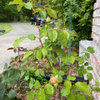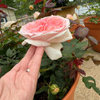Information on Biostimulant - Cytokinin
rockyrose
10 years ago
Living in the Northeast with record-breaking amounts of rain for June and July, along with extreme heat temperatures, has created havoc on my roses. I normally mix the Saltwater Farms brand of seaweed plant food and rose fertilizer as a foliar spray with my Bayer for blackspot. I am interested in trying their product of SeaCom-PGR....
"SeaCom-PGR (0-4-4)
SeaCom-PGR is a liquid plant growth regulator formulated to provide a high concentration (400 ppm) of the natural plant growth hormone, cytokinin. Cytokinin, combined with the diverse micronutrients in seaweed, leads to enhanced crop growth, increased yields, and healthier, more productive plants.
SeaCom is mixed at a rate of 1 tsp. per gallon of water"
In googling more information on Cytokinin, I came across a website from PAN Pesticides Database. I find it hard to believe Saltwater Farms would have a product that is not environmentally safe. Could someone please educate me ....perhaps Henry or michaelg... regarding the toxicity of Cytokinin?
Thanks!
Rose
Here is a link that might be useful: PAN Pesticides Database




AndrewBarocco
wirosarian_z4b_WI
Related Professionals
Reading Landscape Architects & Landscape Designers · 70037 Landscape Architects & Landscape Designers · Jennings Landscape Architects & Landscape Designers · Saint Louis Park Landscape Architects & Landscape Designers · Washington Landscape Architects & Landscape Designers · Westwood Landscape Contractors · Bainbridge Island Landscape Contractors · Bergenfield Landscape Contractors · Crystal Landscape Contractors · Fair Oaks Landscape Contractors · Fort Payne Landscape Contractors · Mequon Landscape Contractors · Peachtree City Landscape Contractors · River Ridge Landscape Contractors · Sun Valley Landscape Contractorshenry_kuska
rockyroseOriginal Author
henry_kuska